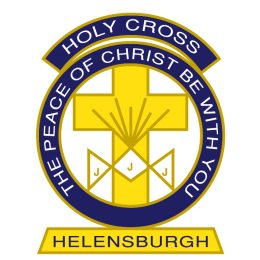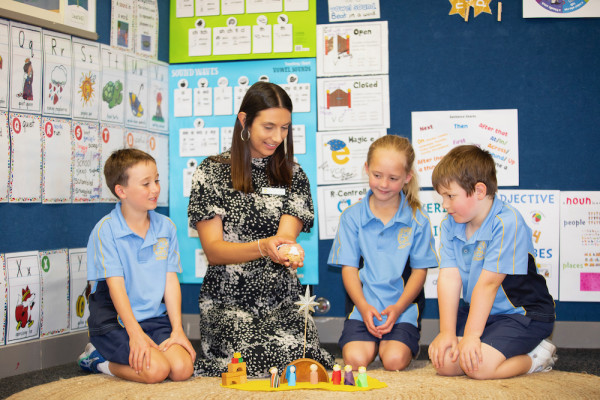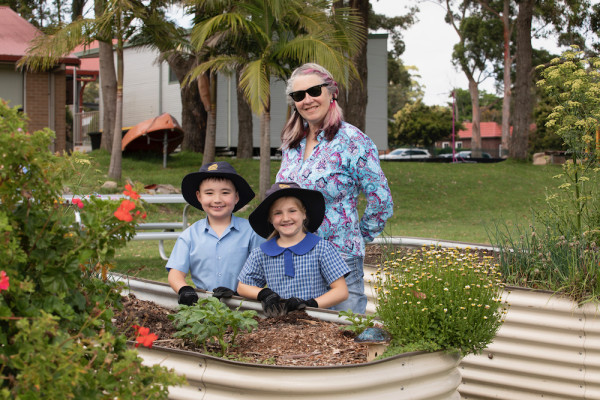
Holy Cross Helensburgh
A Catholic Parish Primary School

The formation of Christian values underpins all that we do at Holy Cross, and students also experience formal Religious Education lessons each day based upon the K-12 Religious Education curriculum of the Diocese of Wollongong.
Religious Education (RE) is one of our Key Learning Areas. The RE curriculum is set by the Bishop of Wollongong in conjunction with Catholic Education Diocese of Wollongong.
The Emmaus Story (Luke 24:13-35) is central to the Religious Education curriculum. The curriculum is based on the four movements of the Emmaus story.
The Religious Education curriculum aims to assist students to reflect upon, make sense of, celebrate and live more deeply the mystery of Christ. Relationship with God is nurtured through catechesis, prayer and ritual enabling/supporting students to contribute positively to the community and culture. The content strands and themes of learning aim to lead students towards love of God, love for others and for all of creation as they become open to the presence and activity of God in their lives.
Explicitly for RE, the teaching and learning process should incorporate storytelling and creative arts, and foster the development of the four cognitive processes of Religious Literacy:
One of the aims of Religious Education (RE) in our Catholic schools is to develop our students' ‘Religious Literacy’ – that is, the way children use their literacy skills to communicate their understanding of the religious tradition to themselves, their peers, teachers and members of the wider faith community.
“By the end of their schooling students know the core teachings of our faith, our Scriptures, history and tradition and how these are to be lived in the world" — Catholic Schools at a Crossroad (2007)
The Religious Literacy Assessment program in the Diocese of Wollongong provides information about the way children process and express their religious knowledge. The assessment involves all Year 4 students across the diocese and consists of a multiple choice and short answer paper, focusing on the students' knowledge and understanding of the key concepts that are taught throughout their Religious Education from Kindergarten to Year 4, and what this means for the way we live, as it is applied in society.
The tasks are developed around the Religious Literacy Framework of Knowing the Tradition, Working with the Tradition, Applying the Tradition and Valuing the Tradition, reflecting Stage 1 and Stage 2 outcomes of the RE curriculum. The data gathered from the assessment is analysed to inform learning and teaching in schools, to focus on professional learning and to recognise and celebrate learning in the domain of Religious Education in the Wollongong Diocese.
 Our school community understands the importance of Mary MacKillop’s words, “Never see a need without doing something about it.” These words hold particular relevance for the ways in which Holy Cross responds to the environmental challenges outlined in Pope Francis' 'Laudato Si’: On Care for Our Common Home'.
Our school community understands the importance of Mary MacKillop’s words, “Never see a need without doing something about it.” These words hold particular relevance for the ways in which Holy Cross responds to the environmental challenges outlined in Pope Francis' 'Laudato Si’: On Care for Our Common Home'.
Holy Cross is committed to being sustainable stewards and responsible citizens that contribute to the building of a better future for humanity and our planet. We are called to be God’s stewards which means managing responsibly the God-given resources we have – our time, our talent, our resources and our treasure.
A stewardship lifestyle enhances the relationships we have with God and with one another. Being God’s steward means trying to live out a commitment to be more Christ-centred and less self-centred. It involves a conversion of our heart – Laudato Si’ calls us to have an ecological conversion, a change in the way we live on this earth.
At Holy Cross, we provide programs and practices that care for our common home, embedded within the school community a commitment to ecologically sustainable actions that promote and nurture ecological conversion.
The Holy Cross School Environmental Management Plan (SEMP) is a tool that enables us to document, implement, reflect and celebrate this commitment as we respond to the challenges from Laudato Si’ to walk our own journey of ecological conversion.
A significant aspect of our commitment to being sustainable stewards and responsible citizens is our famous Holy Cross Gardening Club. Our Gardening Club is sponsored by Peabody mines who fund our resident Ecologist and Environmental Education Officer and specialist School Support Officer, who facilitate targeted environmental education lessons in one class each week. Additionally, they teach and guide our students to maintain our well established garden consisting of native plants, fruits and vegetables during lunchtimes each Thursday.
Read more about how we care for the environment at Holy Cross
The parish provides programs of preparation for the Sacraments of Reconciliation (Penance), First Holy Communion (Eucharist) and Confirmation each year.
The school-based Religious Education curriculum supports and enriches this program of preparation.
Parents are the first faith educators of their children and most particularly model this through the witness of their lives. Parent involvement in sacramental preparation is crucial in shaping the values and attitudes of each child. Knowledge is not the key factor for parents but faith and a willingness to spend time sharing with the child.
Each year, Year 6 students from across the Diocese of Wollongong gather together to celebrate in an uplifting Mass with the Bishop of Wollongong. This occasion is an opportunity for students to encounter Christ through the Eucharist, through their fellow students gathered together and through the presence of Bishop Brian Mascord. The Year 6 Mass also aims to help students understand their place in the diocese, being part of the broader Church community and how they might embrace their Catholic faith as they take their next steps into secondary school.
Each year, Catholic Education Diocese of Wollongong invites Catholic primary schools from across the diocese to submit artworks from Year 5 and 6 students to enter in the CEDoW Christmas Story Art Competition.
Approximately fifty entries that are deemed to best meet the criteria are chosen for an exhibition at the Wollongong City Art Gallery, which is open to the public, commonly around the last weeks of Term 3 and over the October school holiday period each year. Major awards are given at the opening of the exhibition, and approximately 12 finalists are selected for entry into the Sydney Archdiocese Christmas Story Art Competition and Exhibition.
For more information, visit the CEDoW Christmas Story Art Competition site